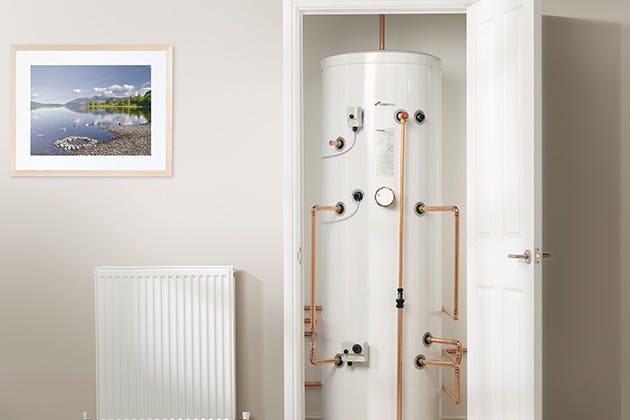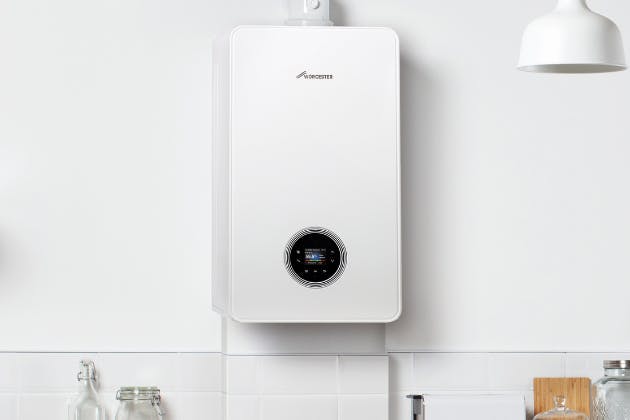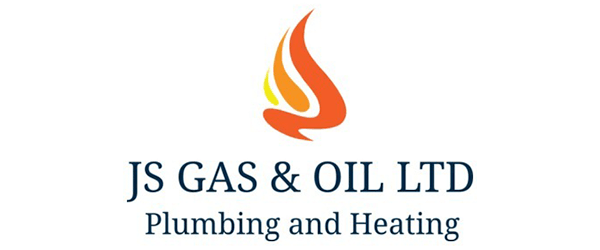Our heating engineers across Bolton, Burnley and Bury are here to help you understand the fundamentals of the various types of central heating systems without any scary technical jargon. Whether you're simply curious, would like to know what heating system is in your home, or are considering upgrading, we go through it all to help you make your decision.

What are the different types of Central Heating Systems?
Conventional Central Heating Systems
The most common sort of central heating system in the home used to be the conventional system. Modern alternatives have reduced usage, particularly in new construction, but traditional systems can still be found in many older homes and buildings.
The conventional central heating system is unplugged and the cold water is controlled by mains pressure. A hot water tank is located high up in the home, usually in the attic or a cabinet on the top floor, to provide hot water which is then used by the boiler to heat it.
By the natural pull of gravity, water can flow down into the lower floors through your plumbing, into radiators, and out of taps once it has warmed up to the correct temperature.
Combi Boiler Systems
Unlike conventional boilers, combi boilers on the other hand heat water at the source. The combi boiler generates heat as soon as you turn on the hot water tap or switch on the boiler. There is no hot water storage because all heating is provided by the boiler at the point of use.
Pressurised Central Heating Systems
The pressurised system, on the other hand, differs from the combi boiler in that the water is heated by a water cylinder rather than the boiler itself. A water cylinder is a tank that heats water as it passes through it. It is a tiny machine that can be conveniently incorporated into the home. As a result, hot water may be dispensed at main pressure from several taps at the same time, making it ideal for large homes.

Tips for Choosing the Right Central Heating System for Your Home
Choosing the appropriate central heating system for your house is essential to preserving efficiency and comfort all year long. With so many options, it's important to take into account things like the size, insulation, energy efficiency, and budget of your home. Here are five suggestions to aid in your decision-making.
Assess Your Heating Needs
Start by determining how much heating you'll need given the size and design of your house. Greater heating system power may be needed in larger homes, while smaller spaces might benefit from more compact models. The number of rooms, the quality of the insulation, and the climate where you live will all affect how much heating capacity is required to keep people as comfortable as possible.
Research Different Heating Systems
Examine the different kinds of central heating systems that are available, such as radiant heating, heat pumps, boilers, and furnaces. Every system has its advantages and disadvantages and functions uniquely. While boilers deliver constant warmth using water circulation, furnaces are recognised for their rapid heating capabilities. Heat pumps provide cost-effective heating and cooling, while radiant heating distributes warmth along walls or the floor. To determine which option is best for your home, compare these options.
Consider Energy Efficiency
Choosing an energy-efficient heating system can minimise the impact on the environment and lower utility costs. For furnaces and heat pumps, look for systems with high Seasonal Energy Efficiency Ratio (SEER) and Annual Fuel Utilisation Efficiency (AFUE) ratings. Furthermore, take into account features that can improve energy savings and customisation options, like zone control, smart heating technology, and programmable thermostats.
Evaluate Installation Requirements
Take into account each heating system's installation requirements before choosing one. While some systems can be easily retrofitted into existing homes, others might require extensive piping or ductwork. Examine the installation's viability in light of the design, construction, and accessibility of your house. When organising your heating system upgrade, don't forget to account for installation expenses and schedules.
Seek Professional Advice
When in doubt, seek advice from HVAC contractors or heating specialists who can offer knowledgeable advice based on your unique requirements. They can evaluate the heating needs of your house, suggest appropriate systems, and offer precise installation quotes. Professional installation also guarantees the safe and effective operation of your heating system, providing you with years of peace of mind.
Contact us for Central Heating Installation
Are you prepared to investigate the various central heating system options and select the ideal one for your house? Explore our guide to keep your house comfortable and effective all year long, gain insights, weigh your options, and make an educated choice. Set out on the path to maximum comfort right now! If you would like to discuss your central heating options with our team across Bolton, Bury and Burnley, simply call us on 07791 802791.


